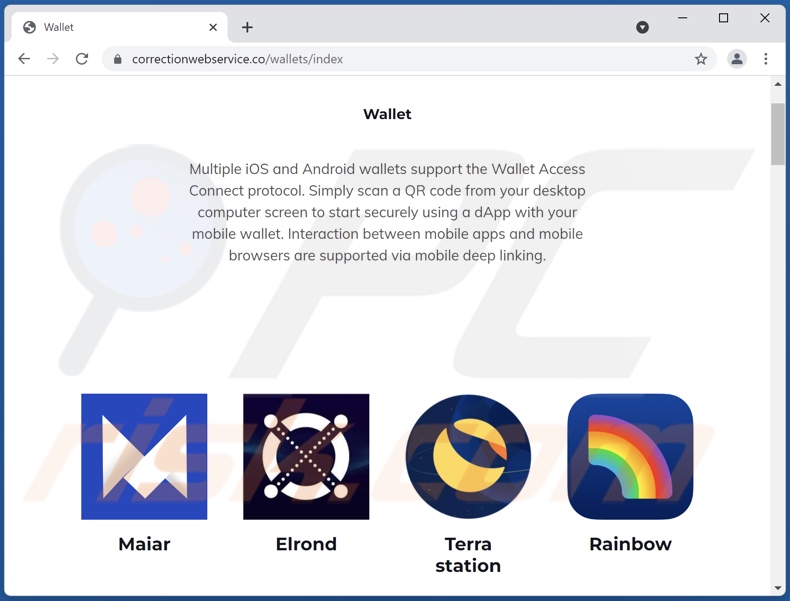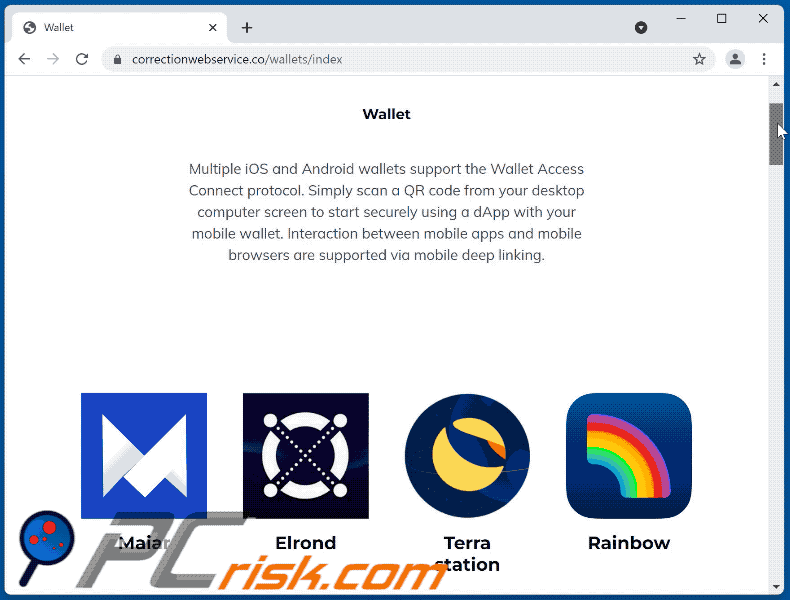Identifying cryptowallet phishing scams like "Wallet Access Connect"
Phishing/ScamAlso Known As: Wallet Access Connect scam website
Get free scan and check if your device is infected.
Remove it nowTo use full-featured product, you have to purchase a license for Combo Cleaner. Seven days free trial available. Combo Cleaner is owned and operated by RCS LT, the parent company of PCRisk.com.
What is "Wallet Access Connect"?
"Wallet Access Connect" is a phishing scam targeting cryptocurrency wallet log-in credentials. We found it when analyzing sites that use rogue advertising networks. This scheme is presented as a tool to ease access between dApps (decentralized applications) and mobile wallets.

"Wallet Access Connect" scam overview
When we accessed a site promoting the "Wallet Access Connect" scam, it appeared similar to genuine cryptocurrency-centered websites. The scheme claimed to facilitate interaction between mobile apps and browsers via mobile deep linking.
It targeted the following digital wallets: Maiar, Elrond, Terra Station, Rainbow, Coinbase, Trust, Argent, MetaMask, Gnosis Safe Multisig, DeFi, Pillar, imToken, TokenPocket, Walleth, Atomic, Authereum, Huobi, Eidoo, Zelcore, Nash, Coinomi, GridPlus, CoolWallet, Alice, AlphaWallet, Tokenary, SafePal, EQUAL, Infinito, MathWallet, MYKEY, Spatium, wallet.io, Infinity, Ownbit, EasyPocket, ONTO, Bridge, SparkPoint, ViaWallet, Coin98, BitKeep, Vision, SWIFT, PEAKDEFI, XDC, UNSTOPPABLE, MEET.ONE, Dok, AT.Wallet, MoriX, and Midas.
When any of the presented wallets were clicked, the scam requested users to enter their log-in credentials (e.g., passwords, passphrases, private keys, etc.). With this information in their possession, the scammers behind the "Wallet Access Connect" scam can gain control over the compromised wallets and the funds stored therein.
| Name | Wallet Access Connect scam website |
| Threat Type | Phishing, Scam, Social Engineering, Fraud |
| Fake Claim | Scam claims to ease access between dApps and mobile wallets. |
| Related Domains | correctionwebservice[.]com |
| Detection Names (correctionwebservice[.]com) | ESTsecurity-Threat Inside (Phishing), Fortinet (Spam), Full List Of Detections (VirusTotal) |
| Distribution methods | Compromised websites, rogue online pop-up ads, potentially unwanted applications. |
| Damage | Loss of sensitive private information, monetary loss, identity theft, possible malware infections. |
| Malware Removal (Windows) |
To eliminate possible malware infections, scan your computer with legitimate antivirus software. Our security researchers recommend using Combo Cleaner. Download Combo CleanerTo use full-featured product, you have to purchase a license for Combo Cleaner. 7 days free trial available. Combo Cleaner is owned and operated by RCS LT, the parent company of PCRisk.com. |
Cryptocurrency-themed scam examples
With the rise in popularity of cryptocurrency, so have schemes centering it. We have researched those that target cryptowallet credentials like Wallet Access Connect, e.g., "Sync Wallets", "Terra Wallet", "Solflare scam", "Phantom Wallet Recovery", "Access via Seed Phrase", etc. As well as those disguised as cryptocurrency giveaways - "PROT Giveaway", "PancakeSwap AirDrop", "BTC giveaway", and so forth.
How did I open a scam website?
We can narrow access to scam websites - to rogue redirects and browsers force-opening these sites. To elaborate, pages that use rogue advertising networks can cause redirects to deceptive/malicious webpages, either when they are entered or when hosted content (e.g., ads, buttons, links, etc.) is clicked.
Spam browser notifications/ intrusive adverts promote scams and can redirect to such pages. Browsers can randomly open scam-promoting and other harmful websites when adware is installed onto them or the system. Additionally, deceptive sites can be accessed through mistyped URLs.
How to avoid visiting scam websites?
We strongly advise exercising caution when browsing. Questionable sites (e.g., Torrenting, illegal streaming/downloading, etc.) are known to promote scams; hence, we recommend avoiding visiting/using them. Dubious webpages can attempt to trick you into allowing them to display browser notifications (that often advertise scams); you are advised to ignore or decline these requests (e.g., click "Block", "Block Notifications", etc.).
Some adware-types are capable of force-opening various websites. To prevent this software from infiltrating the system, we encourage researching apps and browser extensions/plug-ins and only downloading them from official/verified sources.
Additionally, during installation, you should read terms, explore possible options, use the "Custom/Advanced" settings, and opt-out of all bundled supplements.
Having a dependable anti-virus installed and updated is crucial to computer safety. Security software must be used to perform regular system scans and to remove threats. If your computer is already infected, we recommend running a scan with Combo Cleaner Antivirus for Windows to automatically eliminate all threats.
Text presented in "Wallet Access Connect" scam:
Multiple iOS and Android wallets support the Wallet Access Connect protocol. Simply scan a QR code from your desktop computer screen to start securely using a dApp with your mobile wallet. Interaction between mobile apps and mobile browsers are supported via mobile deep linking.
The appearance of "Wallet Access Connect" pop-up scam (GIF):

Instant automatic malware removal:
Manual threat removal might be a lengthy and complicated process that requires advanced IT skills. Combo Cleaner is a professional automatic malware removal tool that is recommended to get rid of malware. Download it by clicking the button below:
DOWNLOAD Combo CleanerBy downloading any software listed on this website you agree to our Privacy Policy and Terms of Use. To use full-featured product, you have to purchase a license for Combo Cleaner. 7 days free trial available. Combo Cleaner is owned and operated by RCS LT, the parent company of PCRisk.com.
Quick menu:
- What is Wallet Access Connect scam website?
- How to identify a pop-up scam?
- How do pop-up scams work?
- How to remove fake pop-ups?
- How to prevent fake pop-ups?
- What to do if you fell for a pop-up scam?
How to identify a pop-up scam?
Pop-up windows with various fake messages are a common type of lures cybercriminals use. They collect sensitive personal data, trick Internet users into calling fake tech support numbers, subscribe to useless online services, invest in shady cryptocurrency schemes, etc.
While in the majority of cases these pop-ups don't infect users' devices with malware, they can cause direct monetary loss or could result in identity theft.
Cybercriminals strive to create their rogue pop-up windows to look trustworthy, however, scams typically have the following characteristics:
- Spelling mistakes and non-professional images - Closely inspect the information displayed in a pop-up. Spelling mistakes and unprofessional images could be a sign of a scam.
- Sense of urgency - Countdown timer with a couple of minutes on it, asking you to enter your personal information or subscribe to some online service.
- Statements that you won something - If you haven't participated in a lottery, online competition, etc., and you see a pop-up window stating that you won.
- Computer or mobile device scan - A pop-up window that scans your device and informs of detected issues - is undoubtedly a scam; webpages cannot perform such actions.
- Exclusivity - Pop-up windows stating that only you are given secret access to a financial scheme that can quickly make you rich.
Example of a pop-up scam:

How do pop-up scams work?
Cybercriminals and deceptive marketers usually use various advertising networks, search engine poisoning techniques, and shady websites to generate traffic to their pop-ups. Users land on their online lures after clicking on fake download buttons, using a torrent website, or simply clicking on an Internet search engine result.
Based on users' location and device information, they are presented with a scam pop-up. Lures presented in such pop-ups range from get-rich-quick schemes to fake virus scans.
How to remove fake pop-ups?
In most cases, pop-up scams do not infect users' devices with malware. If you encountered a scam pop-up, simply closing it should be enough. In some cases scam, pop-ups may be hard to close; in such cases - close your Internet browser and restart it.
In extremely rare cases, you might need to reset your Internet browser. For this, use our instructions explaining how to reset Internet browser settings.
How to prevent fake pop-ups?
To prevent seeing pop-up scams, you should visit only reputable websites. Torrent, Crack, free online movie streaming, YouTube video download, and other websites of similar reputation commonly redirect Internet users to pop-up scams.
To minimize the risk of encountering pop-up scams, you should keep your Internet browsers up-to-date and use reputable anti-malware application. For this purpose, we recommend Combo Cleaner Antivirus for Windows.
What to do if you fell for a pop-up scam?
This depends on the type of scam that you fell for. Most commonly, pop-up scams try to trick users into sending money, giving away personal information, or giving access to one's device.
- If you sent money to scammers: You should contact your financial institution and explain that you were scammed. If informed promptly, there's a chance to get your money back.
- If you gave away your personal information: You should change your passwords and enable two-factor authentication in all online services that you use. Visit Federal Trade Commission to report identity theft and get personalized recovery steps.
- If you let scammers connect to your device: You should scan your computer with reputable anti-malware (we recommend Combo Cleaner Antivirus for Windows) - cyber criminals could have planted trojans, keyloggers, and other malware, don't use your computer until removing possible threats.
- Help other Internet users: report Internet scams to Federal Trade Commission.
Frequently Asked Questions (FAQ)
What is a pop-up scam?
Pop-up scams are messages designed to trick users into performing specific actions (e.g., disclosing private data, making monetary transactions, downloading/installing content, etc.). The "Wallet Access Connect" scheme aims to entice users into providing their cryptowalllet log-in credentials.
What is the purpose of a pop-up scam?
Scams are created to generate revenue for their designers. The creators of this deceptive content may profit from abusing/selling sensitive information, obtaining funds through trickery, promoting (likely untrustworthy/harmful) software, proliferating malware, etc.
Why do I encounter fake pop-ups?
Pop-up scams are run on rogue websites that are seldom visited intentionally. Most users encounter them via mistyped URLs or redirects caused by pages using rogue advertising networks, intrusive advertisements, and spam browser notifications. Adware-infected browsers can force-open scam-promoting webpages as well.
Will Combo Cleaner protect me from pop-up scams?
Combo Cleaner can scan visited websites and alert the user if they are detected as deceptive/malicious. Sites that deliver pop-up scams also fall under these categories - therefore, you will be immediately warned, and further access to such webpages will be restricted.
Share:

Tomas Meskauskas
Expert security researcher, professional malware analyst
I am passionate about computer security and technology. I have an experience of over 10 years working in various companies related to computer technical issue solving and Internet security. I have been working as an author and editor for pcrisk.com since 2010. Follow me on Twitter and LinkedIn to stay informed about the latest online security threats.
PCrisk security portal is brought by a company RCS LT.
Joined forces of security researchers help educate computer users about the latest online security threats. More information about the company RCS LT.
Our malware removal guides are free. However, if you want to support us you can send us a donation.
DonatePCrisk security portal is brought by a company RCS LT.
Joined forces of security researchers help educate computer users about the latest online security threats. More information about the company RCS LT.
Our malware removal guides are free. However, if you want to support us you can send us a donation.
Donate
▼ Show Discussion